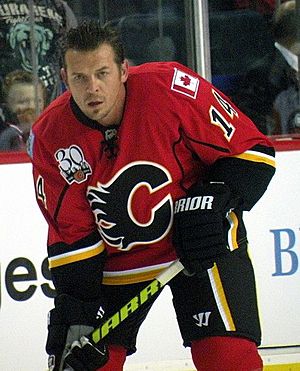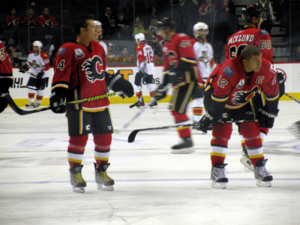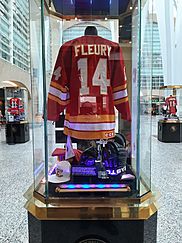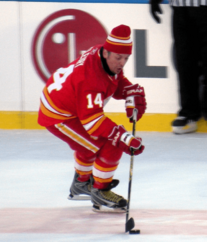Theoren Fleury facts for kids
Quick facts for kids Theoren Fleury |
||||||||||||||||||||||||||||||||||||||||
|---|---|---|---|---|---|---|---|---|---|---|---|---|---|---|---|---|---|---|---|---|---|---|---|---|---|---|---|---|---|---|---|---|---|---|---|---|---|---|---|---|

Fleury with the Calgary Flames in 2009
|
||||||||||||||||||||||||||||||||||||||||
| Born | June 29, 1968 Oxbow, Saskatchewan, Canada |
|||||||||||||||||||||||||||||||||||||||
| Height | 5 ft 6 in (168 cm) | |||||||||||||||||||||||||||||||||||||||
| Weight | 180 lb (82 kg; 12 st 12 lb) | |||||||||||||||||||||||||||||||||||||||
| Position | Right Wing | |||||||||||||||||||||||||||||||||||||||
| Shot | Right | |||||||||||||||||||||||||||||||||||||||
| Played for | Calgary Flames Tappara Colorado Avalanche New York Rangers Chicago Blackhawks Belfast Giants |
|||||||||||||||||||||||||||||||||||||||
| NHL Draft | 166th overall, 1987 Calgary Flames |
|||||||||||||||||||||||||||||||||||||||
| Playing career | 1988–2006 | |||||||||||||||||||||||||||||||||||||||
|
Medal record
|
||||||||||||||||||||||||||||||||||||||||
Theoren Wallace "Theo" Fleury (born June 29, 1968) is a Canadian former professional ice hockey player. He is also an author and a motivational speaker. Fleury played for several teams in the National Hockey League (NHL), including the Calgary Flames, Colorado Avalanche, New York Rangers, and Chicago Blackhawks.
Even though he was one of the smaller players of his time, Fleury was known for his tough and physical style of play. He was drafted by the Flames in 1987 and played over 1,000 games in the NHL. He scored more than 1,000 points in his career and won the Stanley Cup with the Flames in 1989. He also won an Olympic gold medal with Team Canada in 2002.
After facing personal challenges that ended his NHL career in 2003, Fleury has found success in other areas. He wrote a best-selling autobiography called Playing with Fire. In the book, he shared difficult experiences from his childhood. He now works as a public speaker, helping people who have faced similar struggles.
Contents
Early Life
Theoren Fleury was born on June 29, 1968, in Oxbow, Saskatchewan. He was the oldest of three sons. His father, Wally, was a hockey player, and his mother, Donna, was a quiet woman. Fleury is proud of his Métis heritage. His grandmother Mary was from the Cree people.
The family moved to Russell, Manitoba, when Theo was young. His father worked at the local arena. Fleury started playing hockey at age five. He loved the sport and would often go to the arena with his dad very early in the morning to practice.
Because he was smaller than other kids, Fleury learned to be aggressive and determined. His teachers said he would never give up on something until he got it right. This determination helped him in his hockey career.
At age 13, he had a serious arm injury during a game that almost ended his dream of playing in the NHL. But he recovered and later met a scout named Graham James. James saw his talent and promised to help him play junior hockey.
Playing Career
Junior Hockey Journey
Fleury started his junior hockey career in the 1983–84 season. He played for the Moose Jaw Warriors in the Western Hockey League (WHL). He got better each year. In his final season, 1987–88, he scored 160 points, tying with Joe Sakic for the league lead.
Fleury was known for his feisty and physical style. He wasn't afraid to play against bigger opponents. This style helped him protect himself on the ice.
He played for Canada's junior team twice. In 1987, his team was involved in a big on-ice fight with the Soviet Union team, known as the Punch-up in Piestany. Both teams were disqualified. The next year, in 1988, Fleury was the captain of Team Canada and led them to a gold medal.
Calgary Flames Era

Many NHL teams thought Fleury was too small to play professionally. But the Calgary Flames drafted him in 1987. He started with their minor league team, the Salt Lake Golden Eagles, and helped them win a championship.
The Flames called him up to the NHL in January 1989. He quickly started scoring and helped the team win the Stanley Cup that season. It was the first championship in the team's history.
In the 1990–91 season, Fleury had a breakout year, scoring 51 goals and 104 points. He played in his first NHL All-Star Game. He also set a record by scoring three shorthanded goals in a single game.
Fleury became the captain of the Flames in 1995. That same year, he was diagnosed with Crohn's disease, a condition that affects the digestive system. Despite this, he continued to be a top player and led his team in scoring.
In 1999, the Flames traded Fleury to the Colorado Avalanche. The trade was a surprise to many fans in Calgary, where he was very popular. At the time of the trade, he was the Flames' all-time leading scorer.
Colorado, New York, and Chicago
Fleury played well for the Avalanche, helping them reach the conference finals. After that season, he signed a contract with the New York Rangers. His first year in New York was difficult, and he scored only 15 goals.
He had a better season in 2000–01, scoring 30 goals and playing in his seventh All-Star Game. During this time, he scored his 400th career goal and his 1,000th career point. However, he began to face personal challenges that affected his career.
After two seasons with the Rangers, he was traded to the Chicago Blackhawks for the 2002–03 season. After that season, he was suspended by the league due to personal issues, which brought his NHL career to an end.
Later Hockey Career
In 2005, Fleury played senior amateur hockey in Canada. He also played one season in the United Kingdom for the Belfast Giants, where he was named the league's Player of the Year.
In 2009, Fleury attempted a comeback with the Calgary Flames. He played in several exhibition games and was cheered on by the fans. Although he played well, he was released from the team. He then officially announced his retirement, saying he was happy to end his career as a Calgary Flame.
International Play
Fleury proudly represented Canada in many international tournaments. He won a silver medal at the 1991 World Championships and a gold medal at the 1991 Canada Cup.
He played in two Winter Olympics. In 1998, he was part of Canada's "Dream Team" in Nagano, Japan. In 2002, he helped Team Canada win its first Olympic gold medal in 50 years in Salt Lake City. Fleury said winning the gold medal was the highlight of his career.
Life After Hockey
Business and Media
After his hockey career, Fleury has been involved in many projects. He started a concrete business with his family and filmed a pilot for a reality TV show about it. He also launched a clothing line.
In 2008, he even played two professional baseball games for the Calgary Vipers as a fun publicity event.
Country Music Career
Fleury is also a country music singer. In 2015, he released his first album, titled I Am Who I Am. He worked with friends to write the songs for the album. He even wrote a song called "Longshot" for the video game Madden NFL 18.
Career statistics
Regular season and playoffs
| Regular season | Playoffs | |||||||||||||
|---|---|---|---|---|---|---|---|---|---|---|---|---|---|---|
| Season | Team | League | GP | G | A | Pts | PIM | GP | G | A | Pts | PIM | ||
| 1983–84 | St. James Canadians | MJHL | 22 | 31 | 33 | 64 | 88 | — | — | — | — | — | ||
| 1984–85 | Moose Jaw Warriors | WHL | 71 | 29 | 46 | 75 | 82 | — | — | — | — | — | ||
| 1985–86 | Moose Jaw Warriors | WHL | 72 | 43 | 65 | 108 | 124 | 13 | 7 | 13 | 20 | 16 | ||
| 1986–87 | Moose Jaw Warriors | WHL | 66 | 61 | 68 | 129 | 110 | 9 | 7 | 9 | 16 | 34 | ||
| 1987–88 | Moose Jaw Warriors | WHL | 65 | 68 | 92 | 160 | 235 | — | — | — | — | — | ||
| 1987–88 | Salt Lake Golden Eagles | IHL | 2 | 3 | 4 | 7 | 7 | 8 | 11 | 5 | 16 | 16 | ||
| 1988–89 | Salt Lake Golden Eagles | IHL | 40 | 37 | 37 | 74 | 81 | — | — | — | — | — | ||
| 1988–89 | Calgary Flames | NHL | 36 | 14 | 20 | 34 | 46 | 22 | 5 | 6 | 11 | 24 | ||
| 1989–90 | Calgary Flames | NHL | 80 | 31 | 35 | 66 | 157 | 6 | 2 | 3 | 5 | 10 | ||
| 1990–91 | Calgary Flames | NHL | 79 | 51 | 53 | 104 | 136 | 7 | 2 | 5 | 7 | 14 | ||
| 1991–92 | Calgary Flames | NHL | 80 | 33 | 40 | 73 | 133 | — | — | — | — | — | ||
| 1992–93 | Calgary Flames | NHL | 83 | 34 | 66 | 100 | 88 | 6 | 5 | 7 | 12 | 27 | ||
| 1993–94 | Calgary Flames | NHL | 83 | 40 | 45 | 85 | 186 | 7 | 6 | 4 | 10 | 5 | ||
| 1994–95 | Tappara | SM-l | 10 | 8 | 9 | 17 | 22 | — | — | — | — | — | ||
| 1994–95 | Calgary Flames | NHL | 47 | 29 | 29 | 58 | 112 | 7 | 7 | 7 | 14 | 2 | ||
| 1995–96 | Calgary Flames | NHL | 80 | 46 | 50 | 96 | 112 | 4 | 2 | 1 | 3 | 14 | ||
| 1996–97 | Calgary Flames | NHL | 81 | 29 | 38 | 67 | 104 | — | — | — | — | — | ||
| 1997–98 | Calgary Flames | NHL | 82 | 27 | 51 | 78 | 197 | — | — | — | — | — | ||
| 1998–99 | Calgary Flames | NHL | 60 | 30 | 39 | 69 | 68 | — | — | — | — | — | ||
| 1998–99 | Colorado Avalanche | NHL | 15 | 10 | 14 | 24 | 18 | 18 | 5 | 12 | 17 | 20 | ||
| 1999–00 | New York Rangers | NHL | 80 | 15 | 49 | 64 | 68 | — | — | — | — | — | ||
| 2000–01 | New York Rangers | NHL | 62 | 30 | 44 | 74 | 122 | — | — | — | — | — | ||
| 2001–02 | New York Rangers | NHL | 82 | 24 | 39 | 63 | 216 | — | — | — | — | — | ||
| 2002–03 | Chicago Blackhawks | NHL | 54 | 12 | 21 | 33 | 77 | — | — | — | — | — | ||
| 2004–05 | Horse Lake Thunder | NPHL | 7 | 4 | 10 | 14 | 28 | — | — | — | — | — | ||
| 2005–06 | Belfast Giants | EIHL | 34 | 22 | 52 | 74 | 270 | 7 | 1 | 12 | 13 | 34 | ||
| 2008–09 | Steinbach North Stars | HM | 13 | 8 | 19 | 27 | 42 | 4 | 2 | 5 | 7 | 26 | ||
| NHL totals | 1,084 | 455 | 633 | 1,088 | 1,840 | 77 | 34 | 45 | 79 | 116 | ||||
International
| Year | Team | Event | GP | G | A | Pts | PIM | |
|---|---|---|---|---|---|---|---|---|
| 1987 | Canada | WJC | 6 | 2 | 3 | 5 | 2 | |
| 1988 | Canada | WJC | 7 | 6 | 2 | 8 | 4 | |
| 1990 | Canada | WC | 9 | 4 | 7 | 11 | 10 | |
| 1991 | Canada | WC | 8 | 5 | 5 | 10 | 8 | |
| 1991 | Canada | CC | 7 | 1 | 4 | 5 | 12 | |
| 1996 | Canada | WCH | 8 | 4 | 2 | 6 | 8 | |
| 1998 | Canada | OLY | 6 | 1 | 3 | 4 | 2 | |
| 2002 | Canada | OLY | 6 | 0 | 2 | 2 | 6 | |
| Junior totals | 13 | 8 | 5 | 13 | 6 | |||
| Senior totals | 44 | 15 | 23 | 38 | 46 | |||
All-Star Games
| Year | Location | G | A | P | PIM | |
|---|---|---|---|---|---|---|
| 1991 | Chicago | 1 | 0 | 1 | 0 | |
| 1992 | Philadelphia | 1 | 0 | 1 | 0 | |
| 1996 | Boston | 0 | 0 | 0 | 0 | |
| 1997 | San Jose | 0 | 1 | 1 | 0 | |
| 1998 | Vancouver | 1 | 2 | 3 | 2 | |
| 1999 | Tampa Bay | 0 | 2 | 2 | 0 | |
| 2001 | Colorado | 2 | 1 | 3 | 0 | |
| All-Star totals | 5 | 6 | 11 | 2 | ||
Awards
| Award | Year | |
|---|---|---|
| Junior | ||
| WHL East first All-Star team | 1987 | |
| WHL East second All-Star team | 1988 | |
| Bob Clarke Trophy | 1988 (shared) | |
| IIHF World Junior Championship Tournament All-Star | 1988 | |
| NHL | ||
| Stanley Cup champion | 1989 | |
| NHL Plus-Minus Award | 1991 (shared) | |
| NHL second team All-Star | 1995 | |
| Calgary Flames | ||
| Molson Cup | 1991, 1993, 1996, 1998 | |
| Elite Ice Hockey League | ||
| Player of the Year | 2006 | |
| First team All-Star | 2006 | |
Besides his hockey awards, Fleury has also received the Canadian Humanitarian Award and the Queen's Jubilee Medallion for his contributions to Canada. He has also received the Aboriginal Inspire Award and an honorary doctorate degree for his work in helping Canadians with mental health.
 | William M. Jackson |
 | Juan E. Gilbert |
 | Neil deGrasse Tyson |



